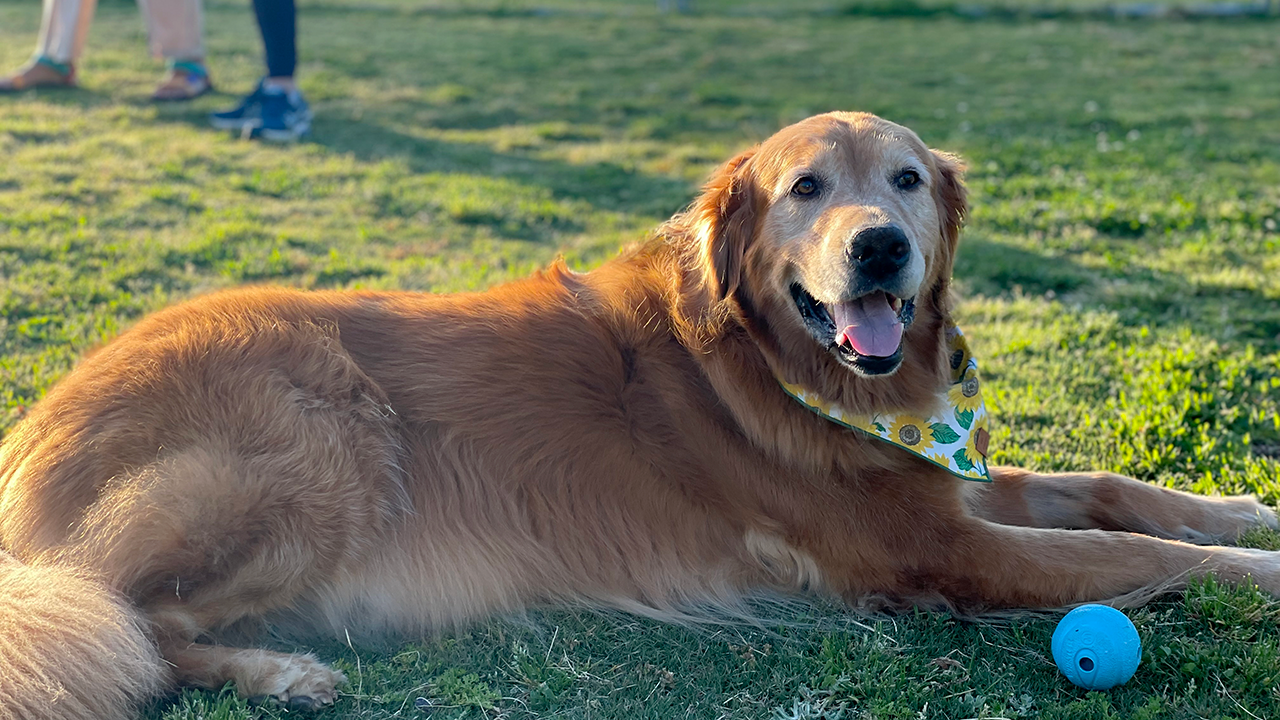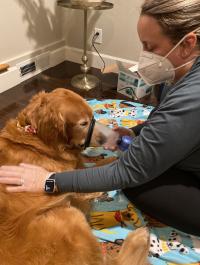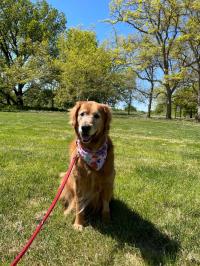
Dog Beats Cancer Odds After Successful Completion of Clinical Trial
“Case of the Month” – April 2025

See NBC Sacramento coverage of this story
See CBS Sacramento coverage of this story
In February 2023, Lola, a 9-year-old golden retriever, was diagnosed with oral melanoma, an aggressive cancer in her mouth that had already spread to her lungs. Lola’s veterinarian told her owner, Allison Roth, that Lola most likely had less than six months to live. She was referred to the Oncology Service at the UC Davis William R. Pritchard Veterinary Medical Teaching Hospital for treatment options.
UC Davis has one of the largest and most comprehensive cancer treatment facilities anywhere in veterinary medicine. Researchers and clinicians at the School of Veterinary Medicine and the School of Medicine routinely collaborate to discover new treatments for a disease that is strikingly similar in dogs and humans.
“When Lola was a puppy, I was treated for a brain tumor at the Mayo Clinic,” said Roth. “Through my multiple brain surgeries, she was always by my side. When it came time for her cancer treatments, I was thrilled that she would be treated at UC Davis – what I would call the ‘Mayo Clinic for dogs.’”
Roth was given two options for Lola’s treatment – she could receive palliative radiation treatments that could give her more time or participate in a study at the school’s Veterinary Center for Clinical Trials that was showing success with a groundbreaking immunotherapy treatment. Roth chose to enroll Lola in the clinical trial.
The study, “Intravenous Doxorubicin and Inhaled IL-15 Immunotherapy for Treatment of Lung Metastases,” was the latest version of an ongoing series of clinical trials of immunotherapy treatments involving inhaling cancer-fighting drugs. The trial was a collaborative study by veterinarians Drs. Robert Rebhun (co-principal investigator) and Michael Kent (co-investigator) and physician Dr. Robert Canter (co-principal investigator), a surgical oncologist with the UC Davis Comprehensive Cancer Center. The study was sponsored by the National Cancer Institute at the National Institutes of Health.

While previous iterations of the IL-15 clinical trial showed success, the researchers wanted to explore additional options of the treatment. In this third version of the trial, ten dogs with pulmonary metastasis greater than 1 centimeter were enrolled in the study with a goal of determining whether preconditioning the immune system with chemotherapy improved response rates to the inhaled IL-15 drugs.
“The previous trials we conducted found that inhaled IL-15 is well tolerated and resulted in durable responses in a subset of dogs with metastatic melanoma or osteosarcoma,” said Dr. Rebhun. “We were excited to see if modulating the immune system with chemotherapy might improve response rates in patients with metastatic tumors to the lung.”
Prior to the trial, x-rays showed many spots on Lola’s lungs. She did not tolerate the single dose of chemotherapy well to begin the trial, and x-rays following the IL-15 inhalation treatments (twice per day for two weeks) were no better. The hope was for the x-rays to show either the same as pre-treatment (meaning no growth) or an elimination of some tumors. Lola’s x-rays showed even more tumor growth.
“She had failed out of the trial at that point,” said Roth, who decided to move on to palliative radiation treatments.
In May and June 2023, Lola received six treatments of radiation therapy – twice per week for three weeks.

“It appeared that we weren’t going to be able to cure Lola's cancer at that point,” said Dr. Kent. “But our goal was to keep the tumor growth in her mouth under control, extend her time with her family, and make her as comfortable as possible.”
While the radiation was able to shrink the tumor in her mouth completely, unfortunately, following the radiation, another x-ray showed continued tumor growth in her lungs.
“We thought we were going to lose her that summer,” Roth said. “But she hung on all summer, and we did another x-ray in September. All her tumors were gone. No one could believe it. Essentially, Lola had experienced a delayed response to the IL-15 trial.”
“In people, immunotherapies can sometimes result in inflammation of tumors, making them appear larger before they shrink,” said Dr. Rebhun. “This is termed ‘pseudoprogression,’ and it appears to have happened with Lola.”
Now almost two years later, Lola appears to be cancer free. She continues to receive regular check-ups at UC Davis, and none of her tumors have returned.
“I don’t know how to express how grateful we are for allowing Lola to be in the trial and for all the care she’s received at UC Davis,” said Roth.
# # #
